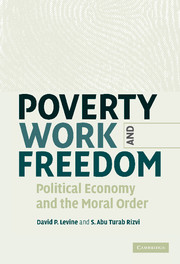10 - Beyond the moral order
Published online by Cambridge University Press: 22 September 2009
Summary
The facilitating environment and the normative order
In this book, we treat poverty as the lack of something vital in living. We consider this something vital the capacity and opportunity to make doing the expression of being. The availability of the capacity depends on a number of factors, the most important of which fall into the category Winnicott refers to as a “facilitating environment.” In concluding, we would like to explore this dimension of the problem in a preliminary way to indicate what our concept of poverty might imply for policy and institutions.
The literature directly concerned with the facilitating environment tends to conceive it narrowly as the environment in the family, and especially the relationships that shape early emotional development. If we were to summarize the issue at this level, the main elements would be (1) the conception of the emerging person held in the mind of the parent, especially whether that conception is animated by the principle of the “freedom of opportunities yet undetermined” as Erikson terms it, and (2) the provision of a setting in which it is safe to make doing an expression of being so that it is possible for self-development to occur.
We can make our main point in the following way. The parent relates to the infant or young child in a specific way, shaping a relationship that has a specific meaning into which the infant or young child fits. We can divide the modes of relating into two groups.
- Type
- Chapter
- Information
- Poverty, Work, and FreedomPolitical Economy and the Moral Order, pp. 129 - 143Publisher: Cambridge University PressPrint publication year: 2005



